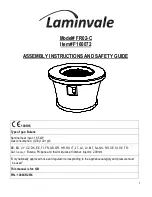
26
106424
DIRECT-VENT FIREPLACE (NATURAL/PROPANE/LP)
DVF34, DVF34P
PILOT AND BURNERS
• Remove ember material before cleaning
burners and replace when cleaning is
complete.
• Burner and controls should be cleaned with
compressed air to remove dust, dirt, or lint.
• Use a vacuum cleaner or small, soft bristled
brush to remove excess dust, dirt, or lint.
LOGS
• If you remove logs for cleaning, refer to
Installing Logs, Lava Rock, and Glowing
Embers, page 23, to properly replace logs.
• Use a vacuum cleaner to remove any car-
bon buildup on logs.
• Replace log(s) if broken. See Replace-
ment Parts on page 30.
• Replace ember material periodically as
needed. See Replacement Parts on page 30.
WARNING: Only parts sup-
plied by the manufacturer should
be used when replacing broken
or damaged glass door panel (see
Replacement Parts, page 30). This
glass door panel is a complete
unit. No substitute materials may
be used.
CLEANING AND
MAINTENANCE
If glass has been broken, carefully remove
glass door (see Removing/Replacing Glass
Door, page 21). Vacuum all glass pieces with
a shop vac.
CAUTION: Wear gloves and
safety glasses while handling or
removing broken glass. Do not
remove if glass is hot. Keep chil-
dren and pets away from glass.
WARNING: Do not operate
fireplace with the glass door re-
moved, cracked, or broken.
VENTING SYSTEM
Conduct annual inspection of the venting
system following these guidelines:
1.
Check areas of venting system that are
exposed to the weather for corrosion (rust
spots or streaks and, in extreme cases,
holes). Have these items replaced imme-
diately by a qualified service person.
2.
Remove the vent cap and shine a flash-
light into the vent. Remove any foreign
material.
3.
Check for evidence of excessive con-
densation. Continuous condensation
can cause corrosion of caps, pipes, and
fittings and can be caused by having
excessive lateral runs, too many el-
bows, or exterior portions of the sys-
tem being exposed to cold weather.
4.
Inspect joints to verify that no pipe sec-
tion or fitting has been disturbed and
loosened. Check mechanical supports
such as wall straps for rigidity.
WARNING: Turn off fireplace
and let cool before cleaning.
CAUTION: You must keep con-
trol areas, burners, and circulat-
ing air passageways of fireplace
clean. Inspect these areas of fire-
place before each use. Have fire-
place inspected yearly by a quali-
fied service person. Fireplace may
need more frequent cleaning due
to excessive lint from carpeting,
bedding material, pet hair, etc.
WARNING: Do not use abra-
sive cleaners as this may damage
glass. Use a nonabrasive house-
hold glass cleaner to clean glass.
Do not clean glass when hot.
WARNING: Handle glass door
panel with care. Do not strike,
slam, or otherwise abuse glass.
Do not operate fireplace with the
glass door removed, cracked, or
broken.
GLASS DOOR
Glass must be cleaned periodically. During
start-up it is normal for condensation to
form on the inside of the glass causing lint,
dust, and other airborne particles to cling to
the glass surface. During initial start-up a
slight film may form on the glass due to
paint curing. The glass should be cleaned
several times with a non-ammonia, non-
abrasive household cleaner and warm water
after the first two weeks of operation. There-
after, clean the glass two or three times
during each heating season, depending on
the usage and circumstances present. Refer
to Removing/Replacing Glass Door on page
21 of this manual when removing glass door
for cleaning.
CAUTION: Do not vacuum if
pieces are hot.
Use only the glass door replacement in-
tended for this fireplace (see Replacement
Parts, page 30 for detail on ordering). No
substitutions may be made. See Removing/
Replacing Glass Door, page 21 for instruc-
tions for replacing glass door.
BURNER FLAME PATTERN
Burner flames will be steady; not lifting or
floating. Flame patterns will be different
from unit to unit and will vary depending on
installation type and weather conditions.
If the vent configuration is installed incorrectly,
the flames will lift or "ghost". This can be
dangerous. Inspect the flames after installation
to ensure proper installation and performance.
Figure 54 shows a typical flame pattern for
DVF34(P) models.
If burner flame pattern differs from that
described:
• turn fireplace off (see To Turn Off Gas to
Appliance, page 24)
• see Troubleshooting, pages 27 through 29
Figure 54 - Typical Flame Pattern
INSPECTING
BURNERS
Continued











































